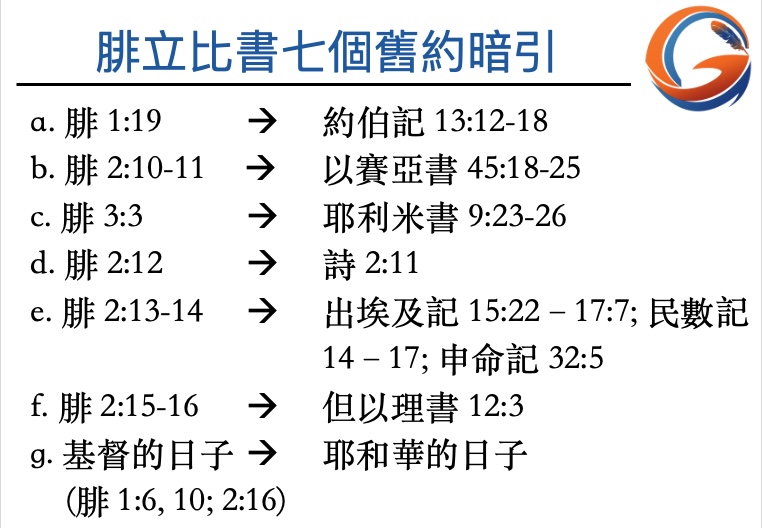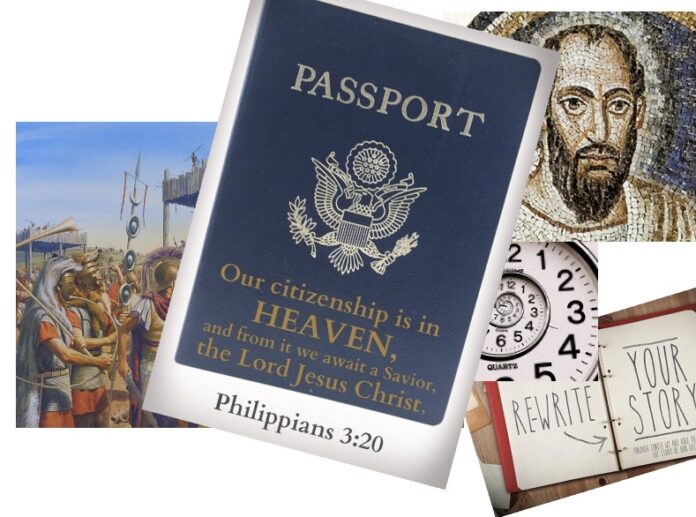- 1. 不只是一般的「行事為人」
- 2. 非同凡響的「小羅馬」腓立比
- 3. 二擇其一的效忠爭奪戰
- 4. 捍衛我們的「核心價值」
- 5. 腓一28 新譯
- 6. 同一事件,多種詮釋,誰主真相?
- 7.「耶穌品牌」代言人爭奪戰
- 8. 基督徒國民海外護照 (CNO)
Πολιτεύομαι,唔係咁樣解的 (8, 完結篇)
腓一30 :
《和合修》: 你們的爭戰,就與你們曾在我身上見過、現在所聽到的是一樣的。
希臘文:τὸν αὐτὸν ἀγῶνα ἔχοντες, οἷον εἴδετε ἐν ἐμοὶ καὶ νῦν ἀκούετε ἐν ἐμοί.
神創造的人,與其他受造物有一個分別,就是懂得將幾個發生於不同時間及地點的事件,敘述成一條故事線。作為一個 Being in Time (Heidegger, 海德格),我們都會就當前的種種遭遇,尋找一些「平行」歷史事件,去為當前看似無意義的事,添上軌跡,「創造」意義。屈在監中的保羅,就在腓一30 將腓立比信徒當前面對的壓迫 (ἀγῶνα),1 與他們過去所見 (εἴδετε),及現在所聽 (ἀκούετε) 的困境,拉成一條故事線。過去曾見的那事件,很有可能就是保羅與西拉,初到腓立比被監禁的那件事(徒十六11~40,另參帖前二2)。對照此事與保羅現在的監禁,兩者的確相似:在傳揚福音過程中與政權出現衝突,繼而肉身受損,招致坐牢。
不容忽視的,是兩者都關乎政權與福音事工的磨擦:在過去,保羅的受苦竟帶來獄警全家歸主;在現在,保羅的受苦竟叫御營全軍都知道保羅受捆鎖,是在基督裡 (ἐν Χριστῷ, 腓一13),是在基督的計劃之中!事實上,就連個別凱撒家裡的人 (τῆς Καίσαρος οἰκίας, 腓四22),都已經加入效忠基督的行列。 2 我仿佛聽到保羅在喊叫:「腓立比的信徒,你們雖然正在為福音受苦,但你們要頂住呀!因為基督的工作,也要藉你們的擺上而成就呀…」
我們都會就當前的種種遭遇,尋找一些「平行」歷史事件,去為當前看似無意義的事,添上軌跡,創造意義。
保羅見證了一個「新護照」的誕生:為別人得福音的好處而受苦,原來不單不是挫折,更是上主彰顯「保護及關照」的窗口。充滿敘事角力的人生,充滿上主護照的記號。可以想像,不是那麼多人,願意走近這窗口去看其中的「美景」。不少與保羅同為領袖的猶太信徒,就反對保羅這見證,一路傳福音,一路抹黑他 (腓一15~17)。在他們眼中,受苦根本與信徒認識主無關。一班與他們持類同理念的猶太信徒領袖,就去了腓立比(腓三2),鼓勵信徒接受割禮,與保羅割席,加入猶太教,享用傳統宗教於帝國既有的保障,不用參與帝王崇拜。
不是那麼多人,願意走近這窗口去看其中的「美景」
君子不立危牆之下,人之常情。然而,因著耶穌故事(腓二6~11, 三20~21), 保羅看見了「美景」:新的人性、新的時代與領土 (腓二9~11)、新的公民憲章(腓一27, 三20),已經(開始)來到。為了論證這故事,保羅就在腓立比書引用了最少七個舊約暗引 (OT Allusions), 去力證他的見證是出於上主。大家有興趣知道嗎?

但凡看見這「美景」的,就是基督國度的公民,並已得著 Christian National Overseas (CNO)。Πολιτεύομαι,應該是咁樣解的。翻成中文,或者就是「作公民」吧。
作者:葉應霖
圖片影片來自網絡
大家好,我是葉應霖。英文名是 Scott。希望您藉著呢個網更深認識神,別人及自己。
Footnotes:
-
One critical exegetical issue centres on the meaning of ἀγῶνα (ἀγών) in 30a, which can either mean “an athletic contest in the moral and spiritual realm with the goal of a virtuous life” or “a struggle against opposition, struggle, fight”. Based on Oakes’ understanding of a predominantly gentile composition of the Philippian community, Arnold again argues that ἀγών should be interpreted strictly within the context of athletics from the Greco-Roman world. However, there are at least two more reasons for favouring the second sense (not necessarily excluding the first).
First, according to Paul Holloway, we cannot detach our understanding of Philippians from Paul’s current imprisonment as a scenario of oppression. In his review of Oakes’ Philippians: From People to Letter, without denying Oakes’ emphasis on the economic side of the persecution, Holloway comments,
But Oakes surely errs when he dismisses the contribution that Paul’s own suffering (imprisonment) made to the Philippians’ distress. Indeed, in 1:25-26 Paul explicitly states that the Philippians’ current discouragement is due precisely to his imprisonment, and he implies as much in 1:27 and 2:17-18.
Second, according to the analysis above (28b-29d), Paul is framing his discourse in a contestation of narratives with respect to suffering (πάσχω, 29d). Importantly, both the antagonist offering an opposing narrative against that of Paul, and the persecutor causing Paul’s imprisonment or potential martyrdom, belong to the same people group: the political authorities. The role of this contentious opponent is just too prominent and critical to be dismissed. Striving toward Christ as the τέλος of life by living virtuously in difficult circumstances is conceptually compatible with Paul’s argument in Philippians, but the context of contestation and suffering with respect to an antagonistic opponent is at least equally true.
See Paul A. Holloway, review of Philippians: From People to Letter, by Peter Oakes, The Journal of Religion 82(3) (2002): 435; Bradley Arnold, Christ as the Telos of Life: Moral Philosophy, Athletic Imagery, and the Aim of Philippians (Tübingen: Mohr Siebeck, 2014), 49–51.
- 這是保羅十三卷書信中,唯一一次提及羅馬皇帝「凱撒」這稱號的經文。










